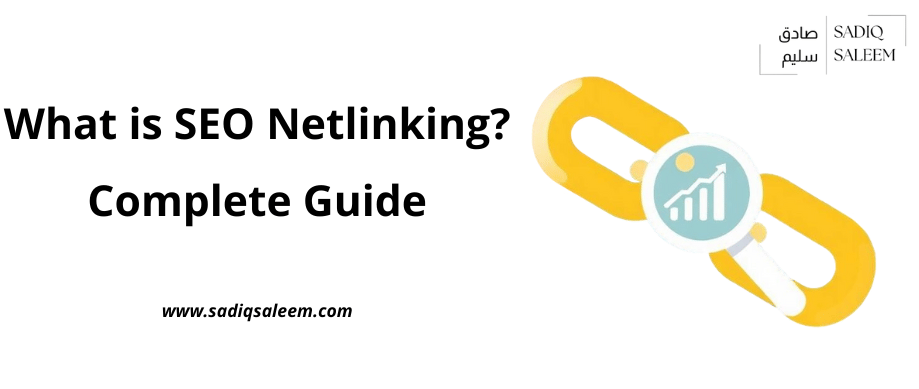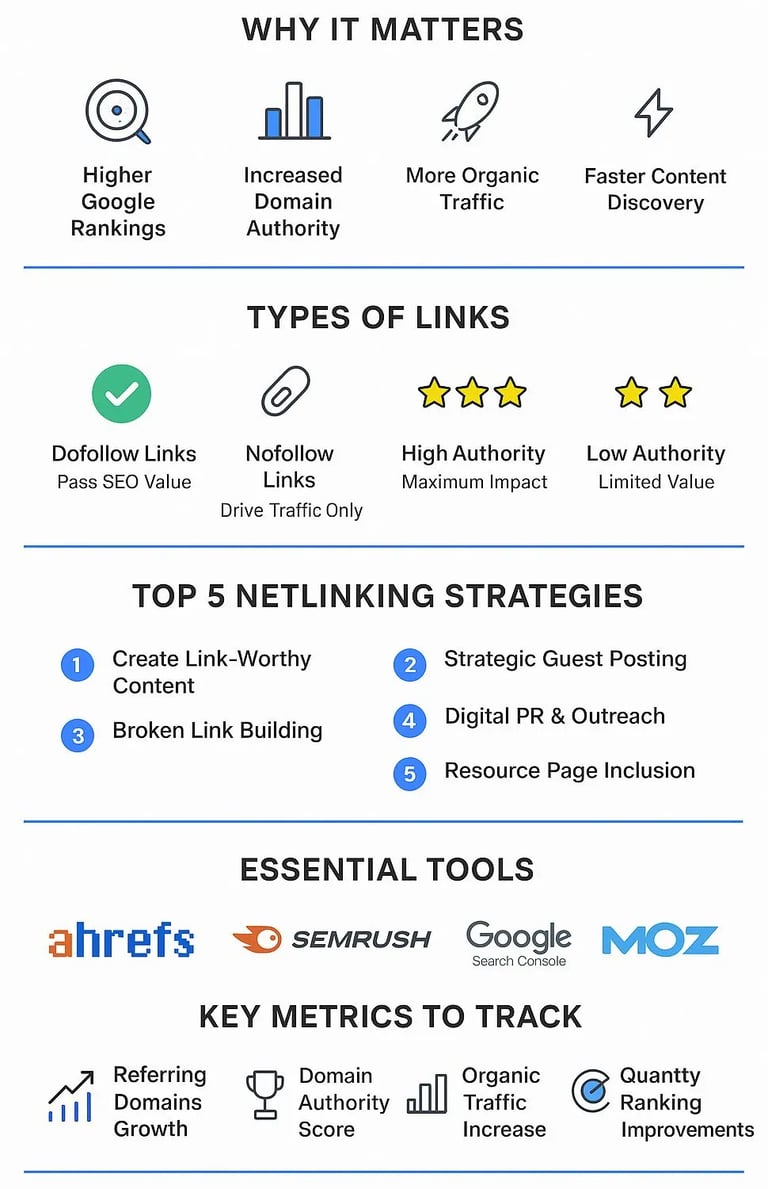What is SEO Netlinking? Comprehensive Guide to Building Your Website's Authority
Learn what SEO netlinking is and how to build high-quality backlinks that improve your search rankings. Here is the complete guide with proven strategies and tools.
Sadiq Saleem
9/12/20258 min read


If you've been diving into the world of SEO, you've probably heard the term "netlinking" thrown around quite a bit. Maybe you want to know what it actually means, or perhaps you know it's important but aren't sure how to get started. Don't worry – I've been in the SEO industry for over five years, and I'm here to tell you in a very simple way.
What is SEO Netlinking: The Foundation of Online Authority
Let's start with the basics. SEO netlinking, also known as link building, is simply the process of getting other websites to link back to your website. Think of it like getting recommendations from friends – when someone vouches for you, others are more likely to trust you.
In the digital world, these "recommendations" come in the form of backlinks. When another website links to your content, they're essentially telling search engines like Google, "Hey, this site has something valuable to say." The more quality recommendations you have, the more authoritative your website appears.
But here's the thing – not all links are created equal. A recommendation from your industry's leading publication carries much more weight than one from a random blog with no credibility. This is where the art and science of netlinking comes into play.
Why Netlinking is Important for Your SEO Success
You might be wondering, "Why should I care about getting links from other sites? Isn't good content enough?" While quality content is absolutely essential, it's only part of the equation. Here's why netlinking deserves your attention:
Search Engine Rankings: Google uses backlinks as one of its primary ranking factors. The search engine's algorithm views links as votes of confidence. More quality votes typically mean higher rankings in search results.
Domain Authority Growth: Tools like Moz measure your website's authority on a scale from 1 to 100. A strong netlinking strategy directly impacts this score, and higher authority sites tend to rank better across the board.
Referral Traffic: Beyond SEO benefits, links from popular websites can send targeted visitors directly to your content. I've seen single high-quality backlinks drive hundreds of relevant visitors to a website.
Faster Indexing: When authoritative sites link to your content, search engines discover and index your pages more quickly. This means your new content can start ranking sooner.
Brand Credibility: Being mentioned and linked to by reputable sources in your industry builds trust with both search engines and potential customers.
The Different Types of Links You Need to Know
Dofollow vs. Nofollow Links
Dofollow links are the standard links that pass "link juice" – the SEO value that helps increase your rankings. These are what you want most of the time.
Nofollow links contain a special tag that tells search engines not to count the link for ranking purposes. While they don't directly improve your SEO, they're still valuable for driving traffic and creating a natural link profile.
High-Authority vs. Low-Authority Links
Links from well-established, authoritative websites in your industry are worth their weight in gold. A single link from a site like Forbes or Harvard University can be more powerful than dozens of links from smaller, unknown sites.
That said, don't ignore smaller sites entirely. A diverse mix of links from various authority levels actually looks more natural to search engines.
Relevant vs. Irrelevant Links
Context matters enormously in netlinking. A link from a fitness blog to your gym's website makes perfect sense. But a link from that same fitness blog to your accounting firm? That's going to raise red flags with Google.
Proven Netlinking Strategies That Actually Work
Over the 5 years, I've tested countless link-building approaches. Here are the strategies that consistently deliver results:
1. Create Link-Worthy Content
This might sound obvious, but it's worth emphasizing: the best link-building strategy starts with creating content that people actually want to link to. This could be:
Original research with interesting findings
Comprehensive guides that become go-to resources
Unique tools or calculators
Thought-provoking opinion pieces
Visual content like infographics or interactive maps
2. Guest Posting Done Right
Guest posting remains one of the most effective netlinking tactics when done properly. Your main objective is to provide value rather than just getting a link.
Look for reputable blogs in your industry that accept guest posts. Pitch unique, high-quality content ideas that would genuinely help their audience. When you provide real value, the backlink becomes a natural part of the equation.
3. The Broken Link Building Method
This technique involves finding broken links on other websites and suggesting your content as a replacement. It's a win-win: you help the site owner fix a problem, and you earn a relevant backlink.
Use tools like Ahrefs, SEMRush or even free browser extensions to identify broken links on relevant sites in your industry. Then, reach out with a friendly message pointing out the broken link and offering your content as a suitable replacement.
4. Digital PR and Outreach
Building relationships with journalists, bloggers, and influencers in your space can lead to natural link opportunities. When you become a trusted source for quotes, data, or expert opinions, links often follow naturally.
Consider creating newsworthy content like industry surveys, trend reports, or timely commentary on current events in your field.
5. Resource Page Link Building
Many websites maintain resource pages that link to helpful tools, guides, and other valuable content in their industry. If your content genuinely belongs on these lists, don't hesitate to reach out and suggest it.
Essential Tools for Tracking Your Netlinking Success
Having the right tools makes all the difference in executing and measuring your netlinking efforts:
Ahrefs is probably the most comprehensive backlink analysis tool available. It lets you see who's linking to you, analyze competitor backlink profiles, and identify new link opportunities.
SEMrush offers similar functionality to Ahrefs, with strong features for competitor analysis and tracking your backlink growth over time.
Google Search Console is free and should be your starting point. It shows you which sites are linking to yours and can help you identify potentially harmful links.
Moz Link Explorer provides valuable domain authority metrics and can help you assess the quality of potential link targets.
Measuring What Matters: Key Metrics to Track
Success in netlinking isn't just about collecting as many links as possible. Here are the metrics that actually matter:
Referring Domains: The number of unique websites linking to you is often more important than total link count. Ten links from ten different sites typically outperform ten links from one site.
Domain Authority: Track your site's authority score over time. Consistent growth indicates your netlinking efforts are paying off.
Organic Traffic Growth: Ultimately, links should help drive more search traffic to your site. Monitor your organic traffic trends in Google Analytics.
Keyword Rankings: Keep an eye on how your target keywords are performing in search results. Quality backlinks should help improve rankings for relevant terms.
Common Netlinking Mistakes That Can Hurt Your Rankings
I've seen too many websites get penalized for poor link-building practices. Here are the mistakes to avoid:
Buying Links: Paying for backlinks violates Google's guidelines and can result in severe penalties. The short-term gains aren't worth the long-term risk.
Ignoring Link Relevance: Links should make sense in context. A random link from an unrelated site can actually hurt more than help.
Over-Optimized Anchor Text: If all your backlinks use the exact same keyword-rich anchor text, it looks unnatural to search engines. Mix it up with branded anchors, generic terms, and natural variations.
Focusing Only on Quantity: One high-quality link from an authoritative, relevant site is worth more than dozens of low-quality links from irrelevant sources.
Neglecting Link Maintenance: Regularly audit your backlink profile to identify and disavow toxic links that could harm your rankings.
Getting Started with Your Netlinking Strategy
Ready to begin building your link profile? Here's a practical roadmap:
Audit Your Current Backlinks: Use Google Search Console or a tool like Ahrefs to see who's already linking to you. This gives you a baseline to work from.
Analyze Your Competitors: Look at where your main competitors are getting their backlinks. This can reveal opportunities you might have missed.
Create Your First Linkable Asset: Develop a piece of content that provides genuine value to your target audience. This could be a comprehensive guide, original research, or a useful tool.
Start with Easy Wins: Look for opportunities like resource pages, broken link building, or guest posting on smaller sites to get your first few links.
Build Relationships: Engage with other content creators, bloggers, and influencers in your industry. Genuine relationships often lead to natural linking opportunities.
If you're feeling overwhelmed by all of this, remember that effective off-page SEO, including netlinking, requires both strategy and ongoing effort. Many businesses find it beneficial to work with experienced professionals who can develop and execute a comprehensive off-page SEO strategy according to their specific industry and goals.
The Long-Term View: Building Sustainable Link Authority
Netlinking isn't a sprint – it's a marathon. The most successful websites build their link profiles consistently over time, focusing on quality and relevance rather than quick wins.
Remember that Google's algorithms are constantly evolving, but the fundamental principle remains the same: links from authoritative, relevant sources will always be valuable. By focusing on creating genuinely useful content and building real relationships within your industry, you'll develop a netlinking strategy that stands the test of time.
Here's How To Make Netlinking Work for Your Business
The beauty of netlinking is that it works for businesses of all sizes and industries. Whether you're a local service provider, an e-commerce store, or a B2B software company, there are relevant websites and publications in your space that could potentially link to your content.
The key is to start where you are and focus on providing value. Don't try to compete with industry giants right away – look for opportunities at your level and work your way up as your authority grows.
You can start by identifying 10-15 websites in your industry that regularly publish content and accept guest posts or have resource pages. Reach out with genuine value propositions, and don't get discouraged if you don't hear back from everyone. Link building is often a numbers game, but quality relationships are what drive long-term success.
Final Notes
SEO netlinking might seem complex at first, but it really comes down to a simple principle: create valuable content and build genuine relationships with others in your industry. When you focus on providing real value rather than just chasing links, the backlinks tend to follow naturally.
Remember that netlinking is just one part of a comprehensive SEO strategy. While backlinks are crucial for ranking well in search engines, they work best when combined with solid on-page optimization, technical SEO, and a great user experience.
Start with the strategies mentioned in this guide, be patient with the process, and focus on building links that will serve your website well for years to come. With consistent effort and the right approach, you'll see your search rankings and organic traffic grow as your link profile strengthens.
The world of netlinking is always evolving, but the fundamentals remain constant: quality, relevance, and genuine value will always win in the long run. Focus on these principles, and you'll be well on your way to building the kind of authoritative online presence that both search engines and users love.


Not all backlinks are the same, and understanding the differences will help you build a more effective strategy:
Hire Your Reliable SEO Expert in Dubai, UAE
With 5+ years of digital marketing experience, I provide you the effective and affordable SEO services to grow and skyrocket your business.
FOR EXPERT SEO ConsultaNCY
HIRE #1 TOP RATED & trusted SEO GUY
contact@sadiqsaleem.com
© 2026. All rights reserved.
Quick links


